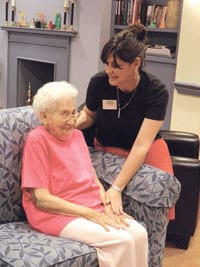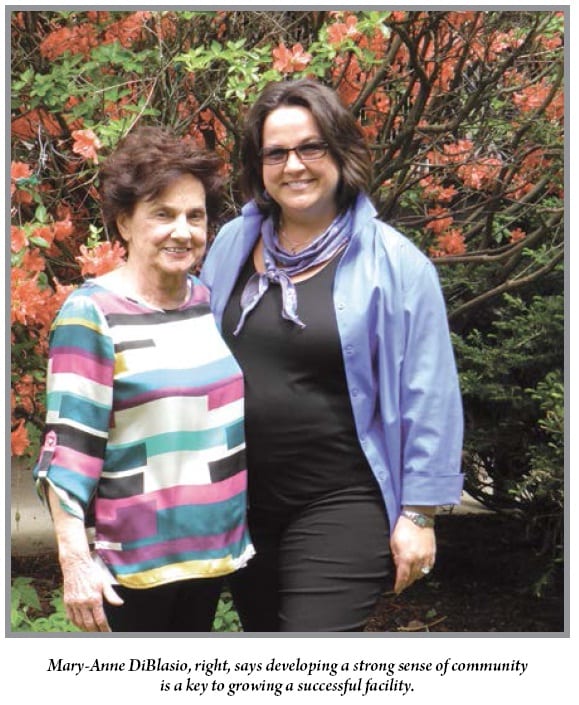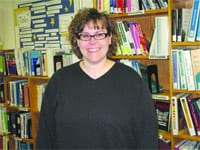A Holistic Take on Senior Living Monastery Heights Caters to the Mind, Body, and Spirit
A peaceful oasis sits high on a hill in West Springfield, surrounded by 18 acres of grounds that are punctuated by walking paths and a beautiful grotto with a gazebo.
For more than 75 years, the historic stone building on the site was home to Passionate priests and brothers, and when a retreat center was added, people who visited Our Lady of Sorrows Monastery found hope and healing there.
Today, the well-known property is still a place that tends to the emotional, spiritual, social, and physical well-being of people. However, it has been transformed into a senior-living community known as Landmark at Monastery Heights, which caters to elders at all stages of life, from those in independent-living and assisted-living apartments to individuals in its Morningstar memory-care neighborhood, which offers 24-hour supervision and a full schedule of activities in a secure setting.
Residents who live on the independent- and assisted-living floors are housed side by side, which makes it easy for them and their families to add additional care when needed. It also makes moving unnecessary, and no one receiving extra assistance is ever identified as living within a particular unit.
But the hallmark of this senior community is the philosophy behind it — a holistic approach to life and the concern paid to the total well-being of each resident, which has been enhanced by a plethora of new offerings this year that range from pet therapy to massage therapy to Reiki.
“We’ve added new programs that incorporate people’s mind, body, and spirit as we want to promote optimal well-being and health,” said Marketing Director Mary-Anne DiBlasio. “People want their parents cared for from a medical perspective, but also want them to live in a place where they are loved and respected, and that has a home-like setting.
“Everyone wants a beautiful location, but what really matters most is how the residents feel,” she continued. “This is a whole new way of community-based living that promotes the independence some people may have lost. Pride and dignity are very important to us.”
Residents have input into what happens, and as their interests are varied, they are encouraged to attend resident council meetings. Some have started their own programs, which include cribbage and Scrabble groups, while a close affiliation with the West Springfield Senior Center has allowed others to institute programs there such as a Seder service started by a Jewish resident.
“We try to give them as much say as possible,” said Regional Marketing Director Sharon Beaudry, adding that the facility recently met a request to add an extra day to the schedule of the hairdresser who works at Monastery Heights.
There is also a lot of interaction with the community, and the Monastery is home to family events as well as programs open to the public, such as a Fall Festival with a farmer’s market on the lawn, which features horse-drawn carriage rides and a vendor fair that includes a booth where Monastery residents sell crafts, photography, and artwork they take pride in. “It really brings out their creativity. The more engaged they become and motivated they are, the higher their level of self-satisfaction and self-worth, which is reflected in better health and wellness,” DiBlasio said.
The West Springfield Parks and Recreation Department holds its summer concert series at Monastery Heights, and residents join the public for relaxing evenings on the lawn. “It’s a way to continually keep ties between the community and what is happening here,” Beaudry said.
DiBlasio said choosing a new home for oneself or a parent can be difficult. “When people come to us, they are overwhelmed. But even if Landmark Heights is not appropriate, we take the time to listen and will make referrals,” she told HCN. “Although we are always making improvements to the property, our focus is always on people.”
Renovating History
Beaudry said that, when the building’s interior was gutted by developer Simsbury Associates after it purchased the property in 1996, the company took care to maintain its historical charm.
“Whenever possible, they left exposed wood and marble as well as the brothers’ chanting chapel,” she said. Thought was also put into what is now the Morningstar neighborhood for people with dementia, which has its own courtyard and garden area.
And since the property opened as Landmark at Monastery Heights, elements such as bird feeders have been added outside and benches placed so people can enjoy nature whenever they venture outdoors.
But creating a strong sense of community is even more important than the surroundings, DiBlasio noted. “This is a new beginning for people, and we have modified our programs in the last year,” she said as she talked about meditation, reflexology, aromatherapy, and extras added to promote health and relaxation. For example, after each yoga class, a licensed reflexologist gives each (willing) participant a hand massage using essential oils.
Art therapy also proves soothing to the spirit, while a wide range of exercise classes that include tai chi, strength training and weekly yoga offer physical benefits.
Monastery Heights also boasts a walking club, and many residents, such as DiBlasio’s mother, Rosemarie Fernandes, enjoy walking the grounds.
Other physical needs are addressed by three full-time nurses, who are in charge of a range of programs and services that include balance assessments and laboratory and pharmacy services.
The former Passionate chapel, with its vaulted, carved ceiling, is a place where peace is almost tangible, and since Monastery Heights is interdenominational, both Catholic masses and Christian services are held there.
Residents also enjoy activities and performances at the West Springfield Senior Center, as well as on-site baking classes that people in independent living, assisted living, and the Morningstar neighborhood participate in. “There is no ‘us’ and ‘them’ here, and our residents with memory impairment are always co-mingling,” Beaudry said.
However, she noted that the number of people seeking independent-living apartments at Monastery is on the rise.
“People come here because they are isolated at home. Even if their children live locally, it is very difficult for them to manage their care, and it doesn’t solve the problem of their isolation,” Beaudry explained, adding that many can no longer drive.
“Living here gives them a level of independence again,” she continued, adding that residents are age 62 and older. “We take them to the grocery store, to do their banking, and to doctor’s appointments.”
A podiatrist visits the facility, and physical and occupational therapy are also administered on site, due to collaboration with a local agency. In addition, everyone who moves in is given a free physical evaluation to determine special needs, such as a raised toilet seat or having fluorescent tape put at the edge of a shower stall and grab bars to help those with poor vision.
“Someone with a walker may also be walking with it incorrectly,” Beaudry said. “We do things to help increase strength, agility, and core balance, and really keep a watchful eye on people. All of our staff is very mindful of that.”
Monastery Heights has its own store, which is stocked with items residents tend to run out of. “We want to be able to accommodate people and maximize their stay. This is their home, and we want to make sure they are completely happy. We always think about them as if they were our own mom or dad,” Beaudry said.
And there are two resident cats, as research shows that pets improve the overall quality of life. Residents can also bring their own small dogs to live there. “Studies have shown that having pets around brings health and happiness to people,” DiBlasio said, adding that the facility recently hosted a dog show.
Dementia Program
Three certified nursing assistants provide care to residents who live in 18 apartments in the Morningstar program, created for residents with dementia. “We invest equally in them as well as in our staff,” said Beaudry. “It all fits into the holistic aspect of our community.”
When residents in this area of the building — or any other — are experiencing anxiety, which can occur for people with dementia at sundown, specially trained staff members are able to give them hand massages or administer Reiki.
“They talk to them while quiet music plays,” Beaudry said. “We also have pet therapy. A woman comes in once a week with her dog, and you can see the residents’ demeanor change.”
In addition, Monastery staff members work with the Alzheimer’s Assoc. to determine the best way to engage residents in meaningful activities and help them express their feelings, since their verbal capacity is diminished.
Beaudry said the facility has adopted the association’s ‘Memories in the Making’ program, which uses artwork ranging from drawing to sculpture and cutting paper, then organizing it, as a creative outlet. “We frame their art and put it on display once a year. It makes the residents feel proud and very special,” she told HCN.
There are also monthly outings to places such as vegetable stands or to take a cruise on the Connecticut River, as well as weekly trips to get ice cream.
“When people have memory loss, they still know who they are as a person and remember their history,” Beaudry said. “We find out what they used to enjoy doing and capitalize on that so our residents feel purposeful and proud.”
For example, a special area was set up for a man who enjoyed workworking, while those who loved to garden can do so in the Morningstar courtyard. Some residents help set the tables for meals, while others enjoy folding laundry.
“They love the tactile feeling, and it makes them feel useful,” Beaudry said. “We promote as much independence as possible, and knowing that they still have the ability to perform simple tasks gives them self-satisfaction, confidence, and a feeling of purpose. We focus on what they still can do.”
Thought is also given to the menu. “Research shows that diet is extremely important to the body and mind, so we work with nutritionists to create food that is reminiscent of what our residents grew up with, and we use organic, local vegetables whenever possible,” she noted.
Rounded Approach
DiBlasio said the facility’s low vacancy rate is the result of a community-based, comprehensive approach to senior living. “Our success comes from the respect and friendship we earn from our residents.
“We are committed to enhancing each resident’s sense of well-being and fulfillment,” she added, “by understanding and meeting their physical, social, and emotional needs on a daily basis.”
Which is, indeed, a truly holistic approach.




Comments are closed.